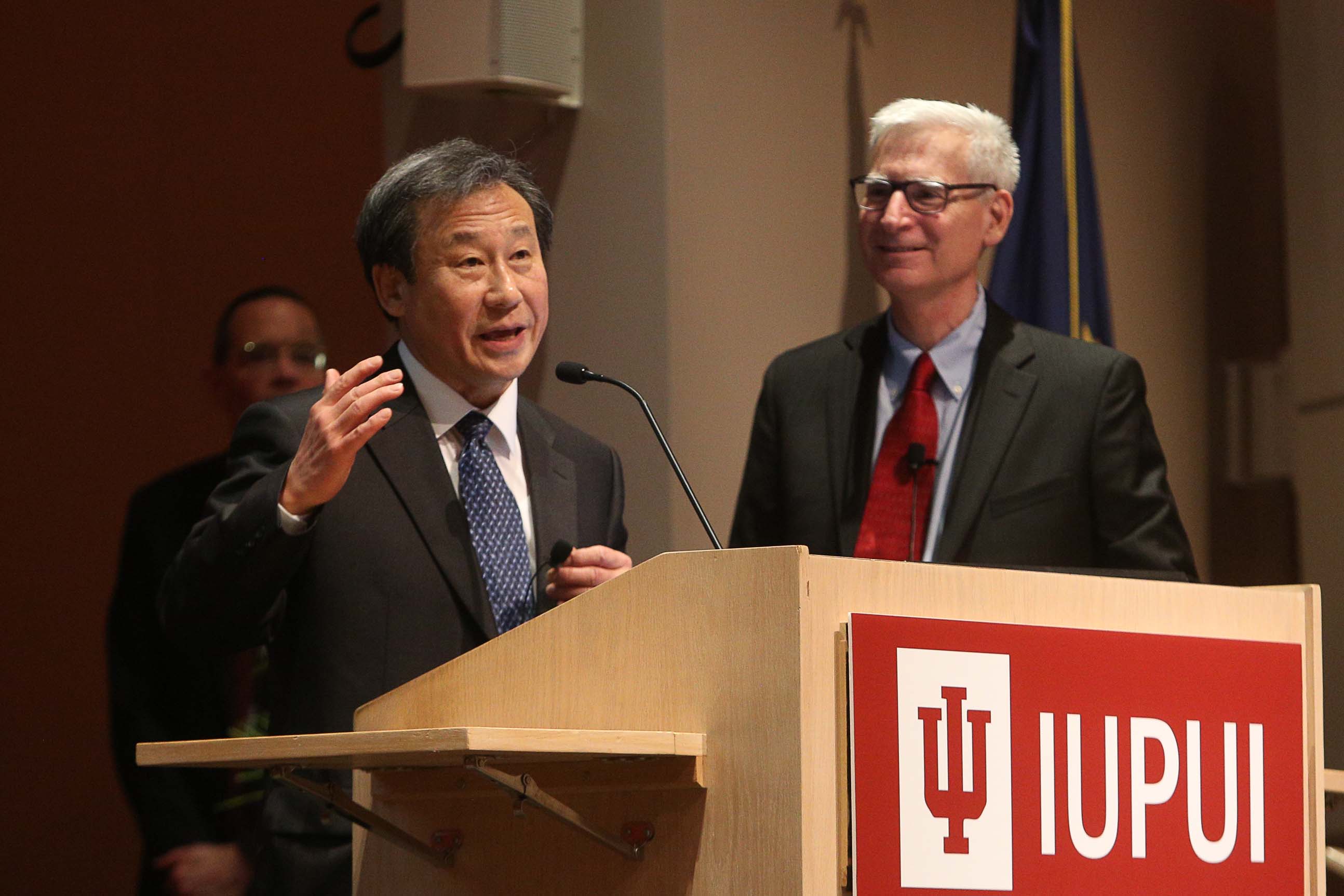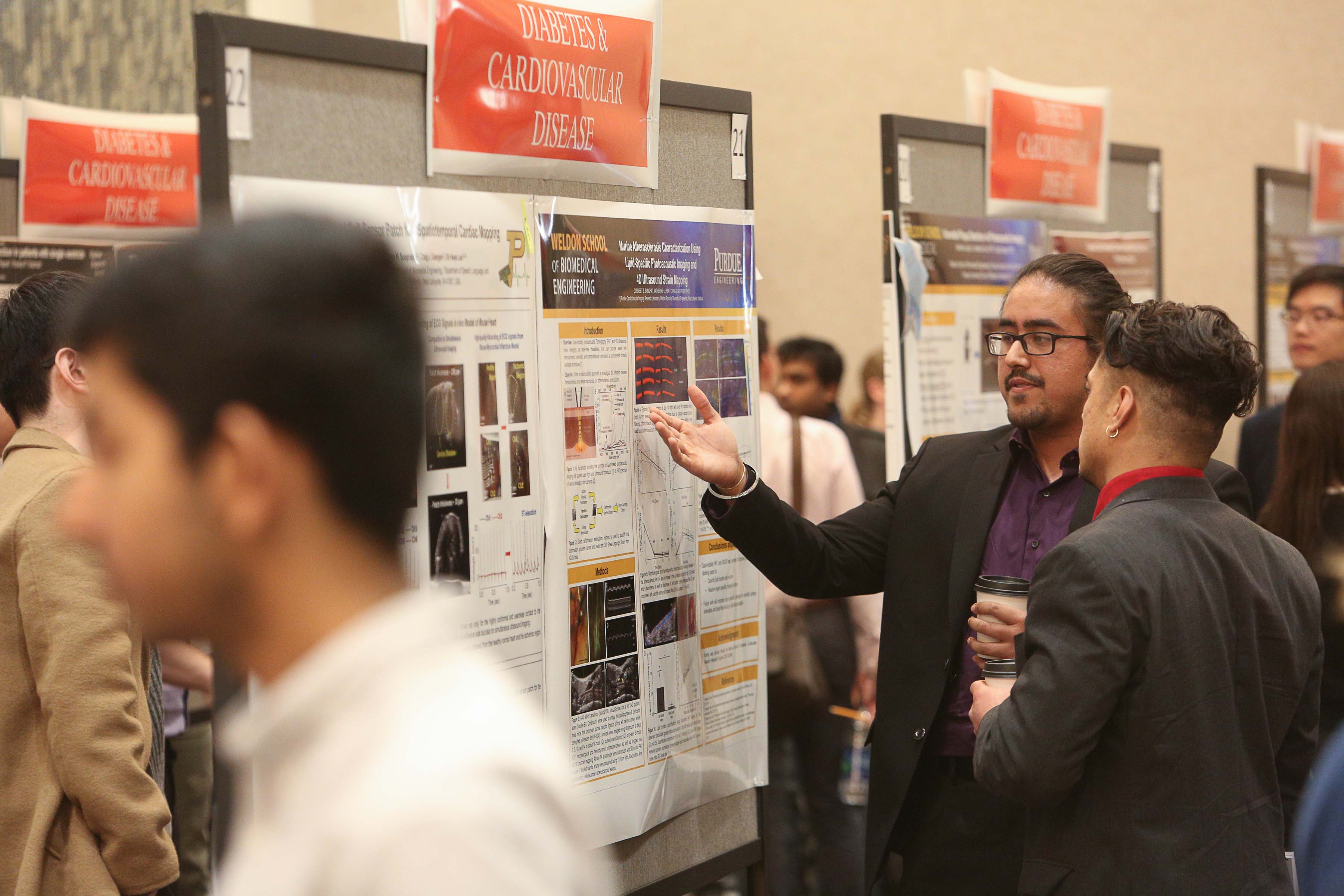Leading clinicians and researchers propose transformative changes in healthcare

The event, co-hosted by the Purdue College of Engineering and Indiana University School of Medicine, was a part of Purdue University’s Ideas Festival, the centerpiece of Purdue’s Giant Leaps Sesquicentennial Campaign, which is a series of events that connect world-renowned speakers and Purdue expertise in a conversation on the most critical problems facing the world. One of the Ideas Festival’s themes is, “Health and Longevity.”
Jay Hess, Dean, Indiana University School of Medicine, kicked off the event with a keynote presentation.
“We’ve made huge progress in healthcare,” Hess said, noting that we’ve seen a steady improvement in life expectancy thanks to improvements in nutrition, sanitation, education, antibiotics, and investments in biomedical engineering. “But still there is a large gap between our knowledge and all of these technological advances being made and the actual improvement of health in our country.”
In a 45-minute address, he spoke about some of the healthcare challenges facing the U.S., including the aging population, chronic diseases, and the unsustainable growth of expenditures on healthcare, and proposed five transformative changes that could spell relief:
1) Spend more on overall levels of health, less on episodes of healthcare;
2) Spend more on health span, less on increasing lifespan;
3) Facilitate greater self-care, such as online connections and point-of-care devices;
4) Incentivize people to make healthier lifestyle choices with financial incentives and devices; and
5) Enable clinicians to spend more time in direct patient care, less time with data entry.
“If we could manage chronic diseases, we could avoid more than a million premature deaths a year, and the savings would be north of $500 billion a year,” noted Hess. The annual savings could be diverted to other critical areas of need, such as education, food, transportation, or renewable energy.
It’s an ambitious goal, he acknowledged. But 50 years ago, we didn’t have smartphones, the internet, or much computing power, and we put footprints on the moon, Hess mused in a nod to Purdue’s most famous alumnus. “Almost anything is possible if we work together toward a common goal…If we focus all of our talent, our energy, our creativity, and our expertise on this problem, we could improve the health of this country and the world.”

George R. Wodicka, Dane A. Miller Head of Biomedical Engineering at Purdue, moderated the event. “In the chronic metabolic disease realm, we are the world’s leaders,” he said of the co-hosting institutions. The broad partnership between the Purdue College of Engineering and IU School of Medicine covers a range of educational programs that are mapped and integrated with growing research activities between the two institutions.

“Between the clinical expertise here in Indianapolis and statewide and the technology expertise driven out of Purdue in just the past 30 years, our collaborations have benefited millions of people worldwide.”
“But these are complicated problems,” Wodicka said, referencing the challenges mentioned in the keynote, “and the solutions required are multifaceted. They require all of us to bring our expertise to the table. The convergence of ideas is critical to the next generation of technologies.”
On that note, he introduced a panel of six leading IU School of Medicine and Purdue Weldon School of Biomedical Engineering faculty members to highlight their recent collaborations and to lead the audience on a deeper dive into monitoring and diagnosing chronic diseases and how they might be transformed into giant leaps in advancing healthcare.
The second half of the event began with an inspirational, forward-thinking student pitch competition. Eight graduate students from the Purdue College of Engineering pitched their 20-year view of engineering in medicine toward health and longevity. The event concluded with over 100 posters showcasing integrated research activities between the two institutions as well as projects for which researchers are seeking collaborators.
The event was a springboard for many of the recent educational and research initiatives that have been launched via the Purdue College of Engineering and IU School of Medicine Engineering-Medicine Partnership, as well as new collaborations to prevent, diagnose, monitor, and treat chronic diseases. The goal of these new initiatives and collaborations is to further enhance Indiana as a world leader in medical technology development and translation.
An archive of the webstream of the event can be viewed and downloaded here: https://iu.mediaspace.kaltura.com/media/Engineering+2169+SeriesA+Health+and+Longevity/0_u4wmnatu
Related:
Purdue College of Engineering and Indiana University School of Medicine announce Engineering-Medicine partnership
Engineering-Medicine Partnership website: https://purdue-indiana.net/

